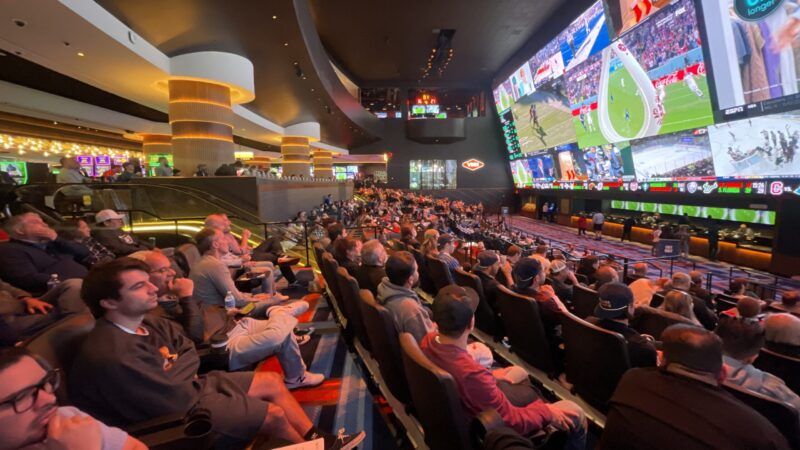Gambling Addiction Isn't Surging
A new study claims addiction is on the rise because internet searches for gambling terms are increasing.

A study published Monday in JAMA Internal Medicine claims to reveal a surge in gambling addiction following the legalization of sports betting. But does a rise in internet searches for gambling terms mean there's been an actual increase in gambling addiction?
After the Supreme Court struck down the Professional Amateur Sports Protection Act (PASPA) in 2018, states were allowed to legalize gambling on sports—since then, 38 states and the District of Columbia have some form of legal sports betting. With the rise of legal sports betting, there's been an explosion of articles, podcasts, and studies about the potential harms of legalization.
On the surface, the study from researchers at the University of California San Diego Qualcomm Institute and School of Medicine appears to lend weight to these concerns, showing a cumulative increase of 23 percent in internet searches nationwide, relative to a counterfactual model, for help with gambling addiction as measured from 2018 through June 2024. But contrary to the study's press release, these results do not show a "surge in gambling addiction."
The study itself doesn't measure clinical outcomes like gambling disorders. While internet search trends can suggest many things, they don't reveal intent, actions, or who is searching. For instance, the National Council on Problem Gambling (NCPG), the country's premier organization tackling gambling addiction, runs a dashboard of incoming traffic to its helpline and makes clear on its website: "This data should not be used as a proxy to estimate problem gambling prevalence."
The NCPG is right not to use these calls as a proxy for problem gambling, not least because a significant share of these calls are not going to be from problem gamblers seeking help but gamblers seeking help trying to place bets. After news breaks of legalization in a state, it's not surprising to see interest in these services tick up. As ads for sports betting increase, so do those for gambling addiction services, with those who were already suffering from gambling problems more aware of resources available to them.
So, what is the rate of problem gambling? According to the NCPG, the national rate of severe problem gambling among U.S. adults is 1 percent, with those experiencing mild to moderate problems making up another 2 percent to 3 percent, which is in line with the historical average.
Few states collect good data on the prevalence of problem gambling. But consider data from one that does, New Jersey.
Historically, New Jersey has had a problem gambling rate above the national average. It was the second state to legalize sports betting in 2018. According to the study, searches for gambling addiction help services rose 34 percent since New Jersey legalized sports betting. In 2021, the latest year for which we have data, problem gambling in New Jersey was 5.6 percent. But in 2017, before sports betting was legal, New Jersey's problem gambling rate was 6.3 percent. If sports betting ads and apps drive big increases in problem gambling, the Garden State has yet to see it.
But there's more reason to be skeptical that legal sports betting will drive a new sustained rise in gambling addiction and financial distress. When lotteries and casinos were liberalized in the 1980s and early 1990s, there was an initial increase in bankruptcies. But this effect largely disappeared after 1995. In the 2000s, with the rise of online poker and illegal internet sportsbooks, many feared there would be an increase in gambling addiction. But in 2011, one of the world's leading experts in gambling addiction, Howard Shaffer, said the evidence "suggests that the rate of PG (pathological gambling) has remained relatively stable during the past 35 years despite an unprecedented increase in opportunities and access to gambling." Shaffer added that the extent of internet gambling for most is "astoundingly moderate." Today's sports bettors are disproportionately college-educated, earn $100,000 a year or more, and spend between $1 to $100 a month on bets.
The United Kingdom and Australia have had online sports betting for more than 20 years, and there's been no change in the rate of problem gambling. It's true that some people, especially young men, who never would've bet on sports have done so after legalization and faced difficulties from overspending. However, the benefits of legalization have also been substantial. The vast majority of sports bets are now placed legally, compared to 3 percent before 2018 when legalization was largely confined to Nevada. Before legal sports betting, around a third of Americans were betting on sports, wagering around $150 billion a year, with money flowing through offshore sports books, with no age verification, less data protection, and with deep ties to organized crime.
Some of the paper's suggestions are reasonable, such as ensuring a larger share of the tax revenue from legal sports betting goes to gambling addiction services. Others, such as limiting how much you can bet, could result in bettors swapping legal apps for offshore betting sites. But in sum, its results shouldn't be used as an excuse for a regulatory crackdown that would breathe new life into the illicit gambling market.


Show Comments (29)